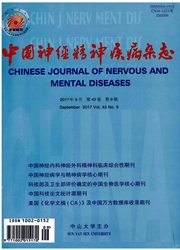

 中文摘要:
中文摘要:
目的了解首发卒中患者卒中后便秘的发生情况;建立卒中后便秘发生预测模型,为预测卒中患者便秘发生的概率和制定预防对策提供依据。方法采用前瞻性调查研究的方法,对154例首发卒中患者进行为期4周的随访,观察卒中患者便秘的发生情况,记录患者的一般资料、测评其发病1周时的卒中病情、日常生活能力、病残程度,并记录卒中临床特点、卒中危险因素、用药情况及由卒中而致的生活方式等的改变。采用Kaplan-Meier法分析卒中后便秘的发生情况,用Cox回归分析方法建立卒中后便秘发生预测模型,并对模型进行检验。结果卒中后4周内85例卒中患者发生便秘,便秘发生率为55.2%。发病1周时的Barthel指数和排便环境改变是影响卒中后便秘发生的主要因素,据此拟合患者卒中后便秘发生的预测模型,建立预后指数方程,并对方程进行回代检验及前代检验,其符合率分别为84.4%和85.0%.灵敏度分别为80.0%和81.3%。结论首发卒中患者卒中后便秘的发生率较高,主要在发病后7d内发生;日常生活能力状态较低且排便隐蔽环境改变的卒中患者较易发生便秘;生存分析预测模型具有较高的符合率及灵敏度,符合临床护理的实际需要。
 英文摘要:
英文摘要:
Objective To investigate the incidence of post-stroke constipation in patients who experienced a first onset of stroke, to set up a predictive model and to provide information for prevention of constipation. Methods A prospective cohort study was performed by investigating 154 cases who experienced a first onset of stroke. The patients were followed up for 4 weeks, and such in- formation as the occurrence of post-stroke constipation, the demographics, patients' condition one week after the onset of stroke, daily living activities, severity of impairments, characteristics of stroke, risk factors, medications, and alterations in lifestyles, etc. was noted. The incidence of new onset of post-stroke constipation was analyzed by using Kaplan-Meier method and the predictive model was set up by using Cox regression. Results There were 85 patients developing post-stroke constipation, with the incidence within 4 weeks after stroke being 55.2%. Barthel Index and the alteration of surrounding for defecation one week after stroke were mainly contributed to post-stroke constipation. The predictive model was set up based on the above 2 factors; the equation of prognostic index was established and tested, with the consistency rates of the internal validation and forward validation methods being 84.4% and 85.0% respectively. The sensitivity and specificity of the predictive model were 80.0% and 81.3% respectively. Conclusion The post-stroke constipation is commonly seen in patients who had a first onset of stroke, with the incidence being the highest within 7 days after the occurrence of stroke. Patients with less daily living activities and alteration of defecation surrounding are more prone to develop constipation. The predictive model has good sensitivity and specificity.
 同期刊论文项目
同期刊论文项目
 同项目期刊论文
同项目期刊论文
 期刊信息
期刊信息
